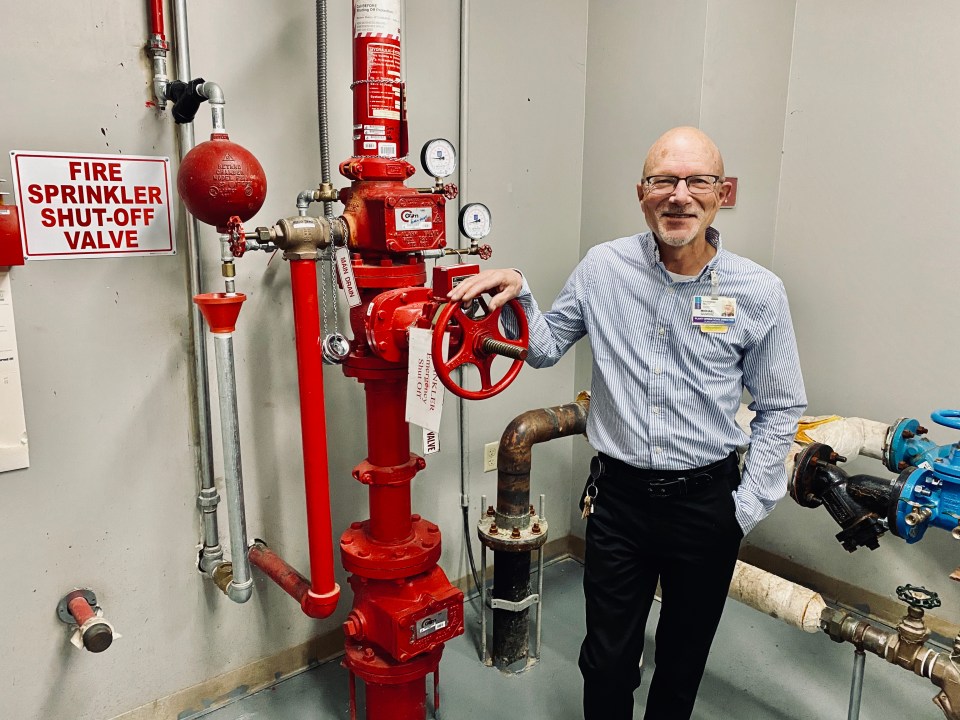As the director of facilities management at Encompass Health Rehabilitation Hospital of City View in Fort Worth, Texas, Michael Gilmore carries the responsibility of making sure that patients seeking rehabilitation for conditions such as stroke, brain injury, Parkinson’s and more can receive a high quality of care in a comfortable, well-kept environment.
The know-how to keep things running
Equipped with knowledge of building systems, OSHA and EPA guidelines and more, Gilmore personally ensures the hospital’s excellent condition. He spends time each day making rounds in patient rooms, addressing service needs and looking for maintenance issues that haven’t been reported yet. This involves checking for cosmetic issues such as chipped paint and blown light bulbs and performing routine examination of fire extinguishers and HVAC units.
These tasks might seem small until you consider that Encompass Health City View is a 62-bed hospital spanning over 63,000 square feet, which means Gilmore does a lot of walking, working and talking with patients.
“If a patient feels too hot or too cold in their room—a feeling that certain medical conditions can cause to vary dramatically each day—the maintenance technician or I will personally come into their room to adjust the temperature. We want their stay to be as comfortable as possible,” Gilmore said.
Maintaining the hospital’s physical condition is certainly a priority, but the upkeep of hidden systems within the hospital walls are even more critical: fire systems, sprinklers and plumbing must run at peak performance, not to mention the elevators that transport patients and staff from floor to floor.
More than a handy man
Facilities managers like Gilmore play an important role in keeping the hospital’s medical equipment running. Gilmore personally repairs therapy equipment whenever possible, elevating support requests to the manufacturer only when necessary in an effort not to halt or delay patients’ scheduled activities.
Facilities managers in Encompass Health hospitals across the country are also responsible for ensuring the facility meets the standards of The Joint Commission (TJC). Encompass Health hospitals undergo an annual evaluation process by TJC to help measure, assess and improve patient safety and quality of care for condition-specific treatment programs.
Gilmore takes this responsibility to heart, and believes his previous career experience made him especially fit for this role.
A history of serving others
He joined the United States Air Force in 1976 and acted as a radio operator for the first four years of his career, a specialized communication role used to direct fighter aircrafts. He later trained in the biomedical electronics field and performed medical equipment repair in two Texas military hospitals, repairing medical devices ranging from X-ray equipment and lab analyzers to sterilizer equipment and ventilators. He also worked for General Electric Medical for several years installing hemodynamic monitor systems in cardiac catheterization labs in north central Texas hospitals.
After a 12-year career in the U.S. Air Force, Gilmore earned a bachelor’s degree in electrical engineering and worked in two acute-care facilities for the better part of a decade, gaining specialties along the way. In 2010, he joined Encompass Health, where has worked for 10 years.
The inpatient rehabilitation setting is the perfect environment to utilize his skills, he says.
“I’ve been married to a registered nurse for 38 years,” Gilmore said. “Because I’ve seen the ins and outs of her career, my understanding of the nursing team and their needs runs deep. I’m motivated to make sure our clinical staff have the best work environment, so they can provide the best care for our patients.”
The content of this site is for informational purposes only and should not be taken as professional medical advice. Always seek the advice of your physician or other qualified healthcare provider with any questions you may have regarding any medical conditions or treatments.



